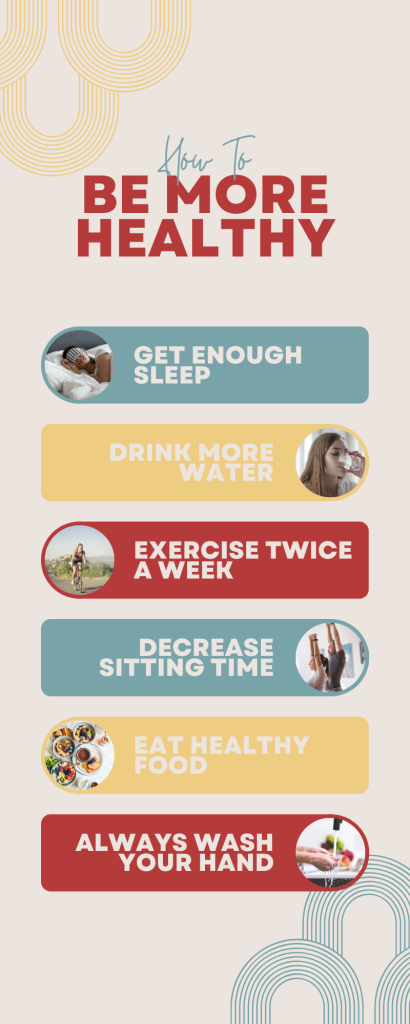Being healthier is one of the few non-negotiable goals everyone should consider attaining. Prioritizing health stretches past more than just physical but also your whole well-being. However, being healthier is quite a vague question, and most people need help knowing where to start. Here, we’ve cited some of the most actionable ways you can add to your routine that should positively impact your health.
Get Enough Sleep
Getting a good night’s sleep is one of the most vital parts of preserving our physical and mental well-being. It is responsible for improving brain performance, regulating mood, and helping you function properly for everyday tasks.
A research study in 2018 emphasized the impact of sleep on attention, cognition, and mood, along with the adverse effects of disrupted sleep and why it is necessary for functionality and survival. The study has shown that in just 16 hours of wakefulness, participants have already begun showing cognitive and attention decline, thus affecting brain health. Poor quality sleep and irregular sleeping schedules are also associated with numerous physical health-related problems such as diabetes, hypertension, chronic diseases, etc.
So how much is enough sleep? As it turns out, it totally depends on every individual when you factor in age, activity levels, health status, and more. A good general rule of thumb suggested by the National Sleep Foundation is 7-9 hours sleep every night for healthy adults. CDC also has an insightful graph showing the recommended sleeping time and how it differs for each age group.
Numerous studies have shown the advantages of having good sleeping patterns and how poor quality and irregular sleeping hours could be detrimental to one’s health. If you want to be healthier, getting enough sleep is an excellent way to start!
Drink More Water
Did you know that approximately 60% of our body mass is water? That is enough reason to comprehend how vital water is to regulating our bodily functions and keeping us healthy. Essential functions such as sweating, digesting foods, thinking, or even breathing require water, so it makes sense why we should keep replenishing our body fluids regularly.
A study in 2010 further emphasizes the negative impacts of dehydration on physical performance, cognition, gastrointestinal, kidney, skin, chronic disease, and heart function. Showing how vital water is for better health and even survival.
Drinking water is easy to forget, especially when you’re having a busy day at work and need more time to get off your desk. There are also so many alternative beverages today, like soda, coffee, tea, and others, that we’d rather have than plain water. This gives us all the more reasons to take drinking water seriously and not take it for granted, as it is one of the best ways you can do to be healthier in the long run.
So how much water is enough? The answer totally varies from person to person as determined by activity levels, weight, age, and other factors. The standard recommendation by the U.S. National Academies of Sciences, Engineering, and Medicine for daily fluid intake is around 3.7 liters on average per day for men and 2.7 liters on average per day for women.
Exercise Twice a Week
One of the first things that’ll come to mind when people say the word healthy is exercise, which is valid for many reasons. Physical Activities are associated with immediate health benefits, including weight loss, reduced health risks, stronger bones and muscles, improved cognitive functions, and many more.
Exercising can be in different forms. Going to the gym and going on a brisk walk outside, playing sports, or any activity that will get your blood pumping should substantially improve your overall health and well-being.
For those having a hard time sneaking in some workout time on their busy schedule, it’s worth knowing that exercising at least twice a week should be enough to reap its health benefits.
If you’re on the journey to becoming a healthier version of yourself, incorporating some time to break a sweat and exercise at least twice a week is an excellent way of preserving bodily functions and improving your physical and mental health.
Decrease Sitting Time
Increasing evidence in research studies shows the correlation between long periods of sitting related to many health concerns, such as an increase in blood pressure, weight gain, risk of cardiovascular disease, and more.
This is rapidly becoming an issue as most people work sitting down. In fact, the typical office employee spends around 15 hours a day sitting. Same case for those employed working from home looking at the screens while being sat down for perhaps even longer than they should.
Decreasing sitting time contributes to better health and is an excellent approach if you plan to take the healthier route. Taking short breaks to stand up, walk or even stretch could totally help minimize the underlying health risks of prolonged sitting time daily.
Eat Healthy Food
One of the most straightforward approaches to being healthier is making smart food choices. Aside from the fact that you get the necessary energy or fuel you need daily from foods, they are also responsible for providing the nutrients your body needs for repair, growth, and preserving your bodily functions.
Poor diet is linked to nutrient deficiency and weakens your overall immune system, raising many health concerns in the long run. With so many alternative diets available in the modern age, it might be harder for people to grasp what healthy eating really looks like.
For starters, the World Health Organization has some basic recommendations for maintaining a healthy diet that should improve overall health, including eating plenty of fruits and vegetables, reducing fat intake, limiting sugars, and avoiding too salty foods.
Always Wash Your Hand
People say, “prevention is better than cure,” which remains true when prioritizing your health. Keeping your hands free from germs could save you from many illnesses and potential health concerns that you could pick up from germs. Those germs quickly pass from object to person and then from person to person, often making people sick.
Proper and regular handwashing is associated with numerous benefits, including reducing the risk of diarrhea, strengthening the immune system, reducing the risk of respiratory illness, and preventing gastrointestinal diseases. Handwashing is very simple yet goes a long way to becoming a healthier person. It is one of the best ways to stop germs from spreading, saving you and the people around you.








